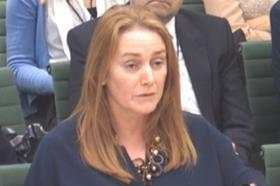MPs told that in terms of the regulations modern methods of construction are ‘open to interpretation’

Senior industry figures believe the country’s building regulations need to be overhauled in order to reflect developments in modern methods of construction (MMC) if the technology is to be used safely when meeting the government’s ambitious housing targets.
Sitting before the housing, communities and local government select committee in Westminster yesterday as part of an MPs’ probe into MMC, Taylor Wimpey’s group operations director Jennie Daly (pictured) said that while approved documents A and B focused on traditional methods of construction, MMC was “left [open] to interpretation to a degree, which is not particularly helpful around compliance”.
Daly said: “There are five elements we would look at in construction using MMC: the structure itself. Then very importantly its behaviour in the event of a fire. Then its thermal and noise performance and its resistance to moisture.
“We would be supportive of the regulations being updated to reflect the needs and different requirements of MMC,” she added.
Agreeing with Daly, Steve Boyes, chief operating officer and deputy chief executive of Barratt Developments, said if MMC was to play a bigger role in getting towards the government’s target of building 300,000 homes a year by the mid-2020s then the Building Regulations would need to be overhauled.
“They need the inclusion of a specific element relating to MMC and there needs to be more clarity around fire safety,” he added.
In another section of questioning which looked at the challenges the industry faces in rolling out MMC across the housebuilding sector, Pocket Living’s head of construction, Alun Macey, said production capacity was an issue, with suppliers of MMC products wary of getting involved into the residential sector.
“There are a lot of modular providers working in other sectors such as infrastructure and education and leisure, but sometimes coming into residential can be perceived as being slightly more risky.
“There are extra hoops they need to jump through. Assuming they can negotiate those hurdles – and we collaborate with them where we can – there’ll be more in the way of supply and we will be able to scale up [our production],” Macey added.
Pocket Living used MMC in half of the 200-plus affordable homes it has delivered and plans to increase this to 70%, Muncey said.
One solution around the supply side might be government intervention, said James Thompson, the former chief executive of Keepmoat Homes and now a non-executive director at the firm.
Ministers might decide to require greater use of MMC through schemes being developed by Homes England, Thompson said, which would help drive up capacity, “as would it adoption through local planning policy”.











No comments yet